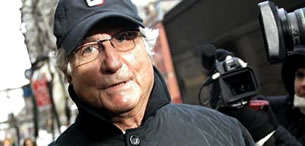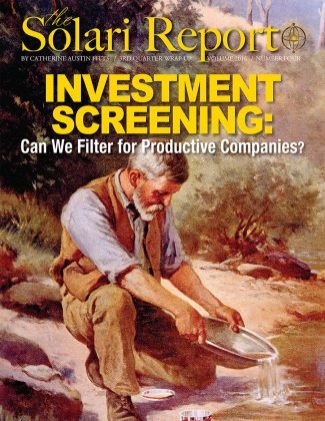These days I am wondering if Madoff’s biggest problem is that he stole from the rich. Feels to me like when you steal from ordinary people, particularly when it makes the rich much richer, it is called “policy” rather than “ponzi.”
For example, let’s review actions of the NY Fed and its member banks, such as JPMorgan Chase, Goldman Sachs and Citibank. The NY Fed serves as the depository for the US government. The US government has refused to comply with the laws regarding financial management and is missing over $4 trillion (or $14,000 per American.) Whatever money is missing would have to leave through the accounts managed by the government’s depository.
These member banks are also at the heart of the gold suppression scheme documented by GATA.org . They are leaders in the derivatives and mortgage markets and – I believe — related collateral fraud. They were present in the pump and dump of the Internet stocks, the telecom stocks and/or the Enron fraud.
Clearly, they have not prevented the problems with naked short selling or stopped the $1 trillion annual money laundering in the US financial system. And, yet, the media would have us believe that Bernard Madoff is the scandal du jour because he produced above market returns for wealthy clients until it turned out that $50 billion was gone. We are told that rich people lost money. We don’t know who got it. After all it could have been richer people who have exhausted opportunities to steal from ordinary people.
We are told that the moral of the story is that we need more regulation. Which means we give more power to the private and public institutions that are operated, staffed and financed by these bankers and which used existing enforcement to create rather than prevent these problems. Does that sound like a good idea to you?
I say the moral of the story is that we need to find out where the $4 trillion and the $50 billion is and get it back. Crime that pays is crime that stays.




Have a look at this website for their comments on Madoff
http://counterpunch.com/
January 15, 2009
Primex Trading’s Dark Pool Operations
Wall Street Powerhouses Invested Alongside Madoff
By PAM MARTENS
There has been much debate among Wall Street veterans as to why major
European investment banks suffered serious damage from the Bernard Madoff
Ponzi scheme while our biggest U.S. investment banks escaped unscathed.
For the past two decades, Wall Street watchers could count on four U.S.
firms to land in the middle of every securities scandal. From Nasdaq price
fixing to fake research to rigging the IPO markets to peddling toxic
subprime assets, one could rest assured that Citigroup’s Smith Barney,
Morgan Stanley, Merrill Lynch and Goldman Sachs would be heading the
lineup. Their complete absence from the greatest Ponzi scheme in history
raises the question: what did they know and when did they know it?
The answer may reside in a pentagonal structure created in 1999 to serve
the interests of a Wall Street cartel.
On September 14, 1999, it was officially announced that Citigroup’s Smith
Barney, Morgan Stanley, Merrill Lynch and Goldman Sachs had partnered with
Bernard Madoff to compete head on with the New York Stock Exchange in a
venture called Primex Trading.
Madoff had bought the rights to a new technology called Financial Auction
Network (FAN) created by Christopher Keith, a 17-year veteran of
technology creation at the New York Stock Exchange (NYSE). Mr. Keith had
retired from the NYSE and started a technology think tank in lower
Manhattan in the early 1990s called Exchange Lab. FAN was one of the early
technology offerings and the rights to develop it were bought by Madoff.
The firm that emerged was Primex Trading, a division of Primex Holdings.
(Primex Holdings holds two patents and may be part of those secret Madoff
assets the court won’t release to the public.)
In addition to harnessing the brains of Mr. Keith from the New York Stock
Exchange, Primex hired Glen Shipway, the Executive Vice President of the
over the counter stock market, Nasdaq, whose duties had included market
surveillance of broker dealers like this gang of five.
The partners made a big splash in the press at the time, extolling
altruistic intentions of getting better prices for their customers in an
electronic version of the New York Stock Exchange.
More at http://counterpunch.com/
Good expose on International Finance and who “Stole” Madoff’s Billions? Long but informative and an interesting read.
http://www.worldreports.org/news/186_settlements_and_refunding_or_dollar_collapses
The Texas Ratio and a new List of Troubled Banks
Catherine, let’s hope your website finds a wide readership in the coming months. On the Fed’s bailout – I thought it remarkable that Goldman Sachs, Pimco, Wellington and Blackrock have been appointed by the Fed to oversee/manage the $500 billion purchase of mortgage backed securities due to be completed by June 2009. Extraordinary. The very entities that have contributed to the financial meltdown in the first place. They have demonstrated little in the way of sound, ethical practices to date and no doubt will command massive fees for their “expertise”.
http://www.bloomberg.com/apps/news?pid=20601068&sid=a160y41WSJvk&refer=economy
dma
Heard you speak Wed. 12/31 on the radio again after hearing about it from Caroline Casey. A recurring theme that I see throughout your writings is about the missing 4 trillion $$$. I don’t think Obama can do everything that is needed to establish the restructuring of the money system and distribution of wealth. It will be up to the people to use their buying and spending power as well as creating local currencies as you have suggested. Its been done before and can be done again. Do you still think the idea of using our dollars to reinvest in local banks is valid? I’m concerned about any of the banks now. PNC which is on the “not good” list has taken over a long standing local bank, national city, here in cleveland. What is your take on the bail out $ being used to take over all our little banks? There are still some banks however locally, that are ok.
Thanks for your work.
Catherine, I came across informatiion about Solari and you just this morning. I was looking for information to help fuel my shipyard. Madoff made off with what appears to be a lot of money. Like you, I believe individuals across the world can began to reconnect the whole human being as we piece together again the common unities of the world. This is why I am building my shipyard. I believe also that it is absolutely no accident or stroke of fortune that Barack Obama has arrived at the pinnacle of American government at this time in history. I am working with groups in Ohio to bring about a greater culture than the one we now have — here and elsewhere. I would greatly appreciate speaking with you and knowing how we may bring together collective efforts.
R.Jackson